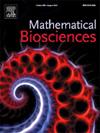A mathematical model to study low-dose metronomic scheduling for chemotherapy
Abstract
Metronomic chemotherapy refers to the frequent administration of chemotherapeutic agents at a lower dose and presents an attractive alternative to conventional chemotherapy with encouraging response rates. However, the schedule of the therapy, including the dosage of the drug, is usually based on empiricism. The confounding effects of tumor-endothelial-immune interactions during metronomic administration of drugs have not yet been explored in detail, resulting in an incomplete assessment of drug dose and frequency evaluations. The present study aimed to gain a mechanistic understanding of different actions of metronomic chemotherapy using a mathematical model. We have established an analytical condition for determining the dosage and frequency of the drug depending on its clearance rate for complete tumor elimination. The model also brings forward the immune-mediated clearance of the tumor during the metronomic administration of the chemotherapeutic agent. The results from the global sensitivity analysis showed an increase in the sensitivity of drug and immune-mediated killing factors toward the tumor population during metronomic scheduling. Our results emphasize metronomic scheduling over the maximum tolerated dose (MTD) and define a model-based approach for approximating the optimal schedule of drug administration to eliminate tumors while minimizing harm to the immune cells and the patient’s body.

 求助内容:
求助内容: 应助结果提醒方式:
应助结果提醒方式:


